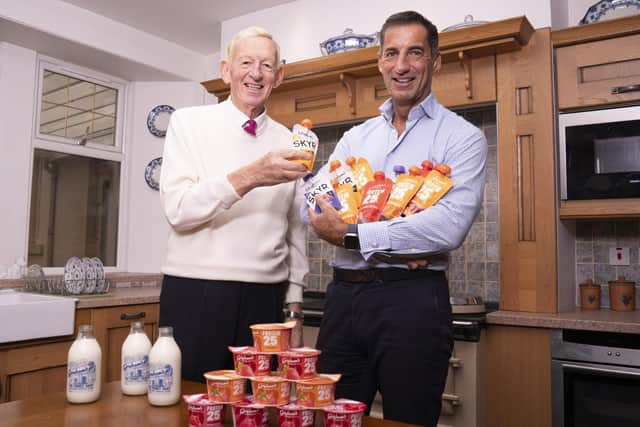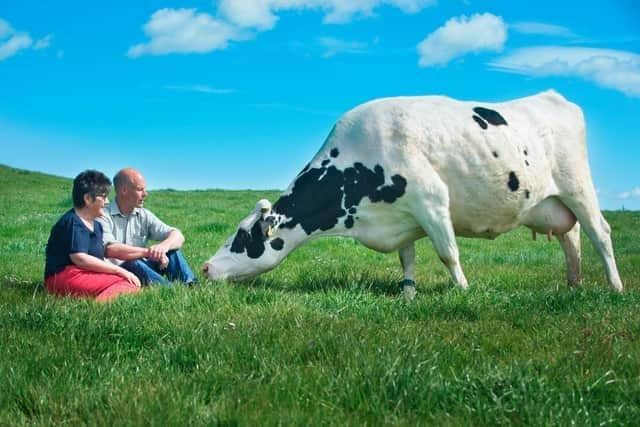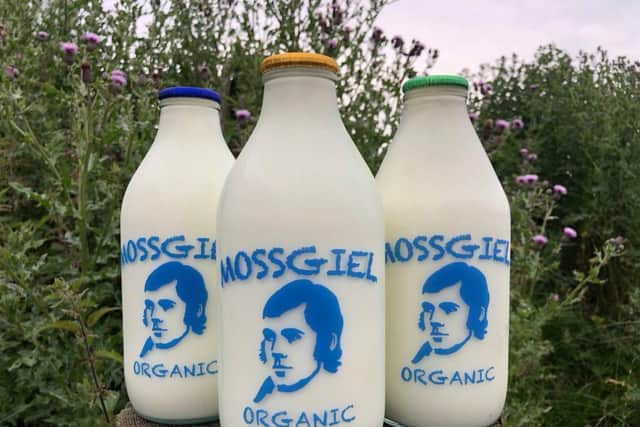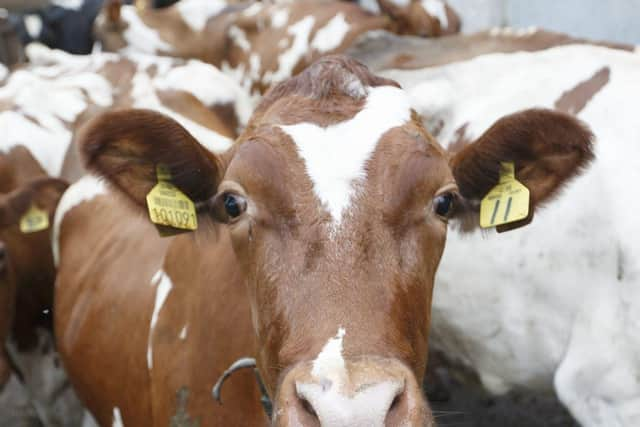Dairy farms Scotland: How global brand Oatly is helping a small Scottish dairy become more sustainable
As the famous quote from Chinese general and strategist Sun Tzu goes, “victory comes from finding opportunities in problems”. This is something that applies to Mossgiel farmer and owner Bryce Cunningham.
Raised on his family farm in Ayrshire, Mr Cunningham was keen to leave and so went off to become a technician for Mercedes. Fast forward a few years and he returned to the farm at a time when his father’s health was failing.
Advertisement
Hide AdAdvertisement
Hide AdBoth his father and grandfather would pass away within a short space of time of each other. It was also at this time the dairy market was in freefall.


Mr Cunningham said: “Our business, ten years ago, was a conventional dairy farm, and my father, who was the farmer at that time, was milking 150 cows and selling through a local milk buyer. This milk was then made into cheese to be sold to UK supermarkets.
"On a global scale, this was the time that the milk prices began the most recent collapse. I had just taken the business on after ten years working for Mercedes, so I had no idea what I was doing. Ultimately, at this time, the bank decided we were no longer a viable business.”
Instead of leaving all this behind and returning to cars, Mr Cunningham decided to take a chance on a different way of farming, one that sprang from necessity. As his family were tenants of the farm, they didn’t lose it when the business went under, plus they still had 20 Ayrshire dairy cows.
Mr Cunningham decided to “turn back the clock” and sell milk to the local community, rather than using a product buyer. This led to the business doing away with plastic containers in 2019 and introducing a cow and calf system. This involves the calves staying with the cows until they are weaned, rather than being separated after 24 hours as is common. Since 2016, Mossgiel milk has been certified organic, and Mr Cunningham works with other organic farms in the area to send glass bottles of milk to supporting businesses for delivery across Scotland as well as supplying specialty coffee shops.


“We ended up farming the way that my grandfather would have done in 1948 when he came here originally,” he said. “We couldn't afford to feed our cows fancy cereals and fancy concentrates. We couldn't afford fertiliser, and we couldn't do lots of different things, so we accidentally fell into becoming organic.
"As we’ve grown, we’ve kept in our mind that we wanted to farm traditionally, but in a modern way, and to listen to our customers about how they’d like to see us farm. One of the things that came out of that was keeping the calves with cows. It’s certainly been a voyage of discovery.”
Mr Cunningham, who admits he hated anything to do with farming as a teenager and could not wait to leave, is applying this ‘can-do’ attitude to a climate of activism and dairy-free alternatives that line the supermarket shelves by working with one of the biggest vegan milk alternative brands Oatly.
Advertisement
Hide AdAdvertisement
Hide AdLate last year, the Swedish oat firm posted on social media it wanted a ‘big dairy executive’ to join them on a Reddit AMA [ask me anything] panel to discuss climate labelling on food products. Mr Cunningham got in touch and found he was the only one within the dairy industry within Europe to do so.


This has led to the farmer and Oatly working together to define Mossgiel’s carbon footprint, which is all part of the evolution of the farm. Caroline Reid, director of sustainability EMEA at Oatly, said of the Reddit chat last year: “Sadly, no big dairy execs wanted to talk about climate footprint labelling with us. However, we did get one reply from farmer Bryce, who runs a small dairy farm in Scotland. Whilst an oat drink company and a cow’s milk company might not agree on everything, there is one thing we do agree on – big dairy and our food system needs to change.”
Mr Cunningham hopes to be the expert in cow-and-calf practices in a bid to encourage more farms to take up the measures. He now employs a herd happiness manager who has named all the cows and calves, whose bloodline can be traced back to Robert Burns’ time on the farm.
“We would love to be the platform for cow with calf and organic dairies to sell milk into, and we can then distribute to places like Locavore and other ethical retailers who will then distribute to homes across Scotland,” Mr Cunningham said. “We think we’ve cracked the cow with calf system and have a blueprint for it.”
Another cow with calf dairy is the Ethical Dairy in Dumfries and Galloway. Owners Wilma and David Finlay have just sold their long-term business, Cream O’ Galloway, which produced and sold ice cream across the UK.


Wilma, who for around 15 years had been concerned about the impacts of the former business, had been advocating for a cow and calf system for some time. During plans for renovation at the farm, it was decided they would trial this and so the Ethical Dairy began.
“Around 2008 we were looking at the socio social and economic issues, with regards to climate change and resource depletion and thought ‘should we be doing something else?’" Wilma said. “We decided we should try and start making cheese, which started in 2013 and as I had been badgering David for many, many years about keeping cows with their calves, we decided to try this then.” Since setting up the Ethical Dairy, the couple have seen good demand for their cheeses. They only sell milk locally.
While bigger farms, such as Graham’s the Family Dairy do not see the cow and calf practice working for them, they have seen a huge rise in their protein products which were launched in 2017 and have been outselling milk.
Advertisement
Hide AdAdvertisement
Hide AdFarming and keeping cows in Scotland may be an ancient practice, but it’s businesses like these hoping these modern methods keep the industry alive for generations to come.
To hear more about this topic, search Scran wherever you get your podcasts from Friday, January 19.
Comments
Want to join the conversation? Please or to comment on this article.